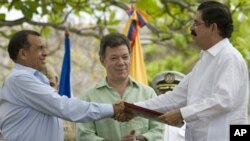Another chapter closed on the 2009 political crisis that threatened stability and democracy in Honduras when former President Manuel Zelaya returned from exile on May 28. Wearing his trademark white cowboy hat, Zelaya was greeted in Tegucigalpa, the nation’s capital, by thousands of supporters in a festive, peaceful scene that only months ago would have been unimaginable.
In June 2009, Zelaya was forced from office and exiled in a dispute over a poll to ascertain popular interest in having a Constituent Assembly convened to reform the constitution. His removal sparked condemnation throughout the Americas. Zelaya returned to Honduras secretly in September 2009 and obtained refuge in the Brazilian Embassy. After President Porfirio Lobo was inaugurated in January 2010, following a previously scheduled election in November 2009, he granted safe passage to allow Zelaya to leave Honduras for the Dominican Republic. Negotiations for Zelaya’s latest return to Honduras were held this spring with President Lobo’s government.
Under President Lobo, Zelaya returned to a country that has enacted many of the changes he advocated before his removal, including a change in the procedures for amending the constitution. This initiative, Honduras's return to the Organization of American States and other actions are positive results of the national reconciliation policy that President Lobo's government has pursued.
In a recent demonstration of Honduras’ progress, on June 26 Zelaya spoke to a National Popular Resistance Front rally and encouraged peaceful change. Delegates voted to organize an alliance of opposition groups and field candidates in the 2013 elections. While spirited, the event came off without incident. The United States looks forward to the release of the Honduras Truth Commission report on July 7, and hopes that the recommendations will help to build consensus about reforms that would help prevent future political crises.
Reconciliation In Honduras

Under President Lobo, Zelaya returned to a country that has enacted many of the changes he advocated before his removal.



